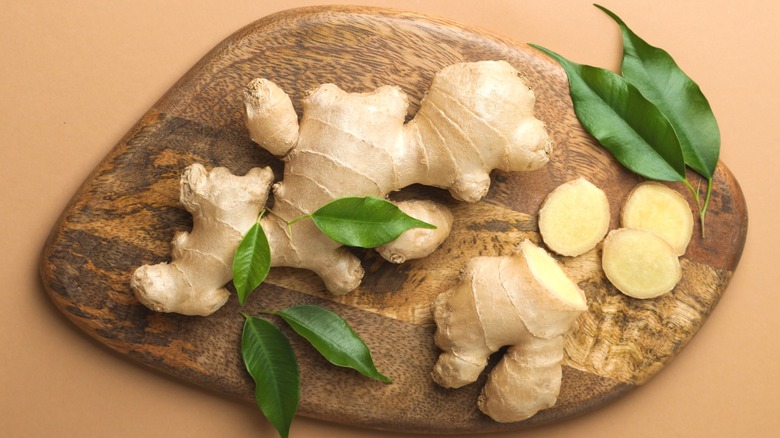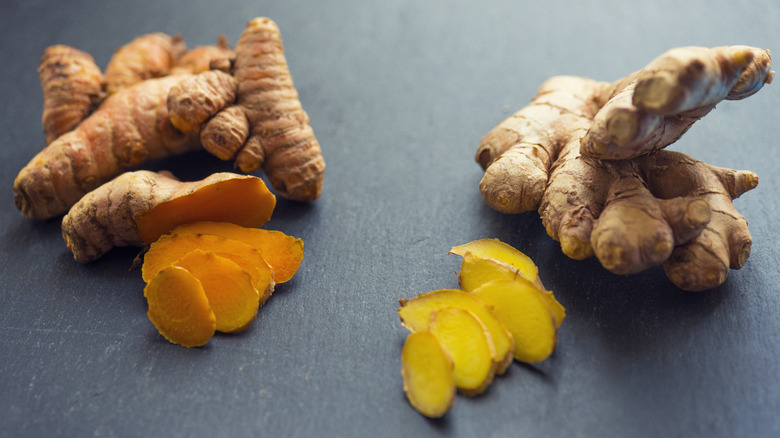Fresh Ginger Is The Key To Aromatic Food Without Alliums
Alliums regularly used in cooking include garlic, onions, leeks, scallions, shallots, and chives, so you may immediately feel lost if you need to remove them from a recipe, but an easy substitute is fresh ginger. Like alliums, ginger is a great aromatic base to start with. It can easily be added to the mirepoix of French cuisine, which normally consists of onions, celery, and carrots, or the Italian mix of soffritto, which starts out the same as mirepoix but to which gets added garlic, fennel, and parsley.
While some people love the pungent flavors of alliums, others have an aversion and can't stomach the taste. For onion haters, the tiniest hint of it in a dish will ruin their day. Some individuals are allergic to or intolerant of alliums altogether, which means favorites like French onion soup and garlic bread are off the menu. But all is not lost. With some willingness to experiment with new flavors, fresh ginger is an excellent stand-in.
How to cook with ginger instead of onions or garlic
Ginger has a strong and unique flavor that is described as spicy, warm, peppery, sweet, pungent, and piquant. It is an integral part of Asian, Southeast Asian, African and Caribbean cookery, and prevalently used in the cuisines of India, China, Thailand, Japan, Nigeria, and Jamaica. Asian dishes are particularly adaptable to switching out onions or garlic for ginger. While the flavors are not the same, ginger can still provide that savory, fragrant punch usually imparted by alliums.
Experiment with spices to come up with a compatible blend. Ginger with cumin can be a good substitution for the slightly buttery taste of roasted garlic, while the addition of lemon zest or even horseradish to grated ginger can mimic the sharp pop of raw garlic. For a twist on caramelized onions, instead try pan-frying some thinly sliced ginger in butter with citrusy coriander, along with a touch of sugar or dates for sweetness, and smoked paprika for its smoky notes and color. This makes for an irresistible burger topping.
Don't be afraid to break all the rules. Get creative with unexpected flavor pairings and seasoning combinations. A mirepoix of ginger, celery, and carrots may not be traditional, but it's a delicious base for vegetable soup or coconut curry. Minced fresh ginger is a great replacement for garlic in salad dressings and marinades, and works especially well with beef, shrimp, and tofu.
Ginger for good health and a clear conscience
Other ingredients to try when cooking without alliums are roasted fennel in place of scallions, celery and radishes for raw onions, and the famously stinky asafetida, which when cooked down mellows into a flavor reminiscent of garlicky eggs. While ground ginger powder is perfect in sweets and baked goods, fresh ginger is better suited for savory foods, where its aromatic scent and tanginess will be most potent. Notwithstanding, a handy reference to keep in mind is that a tablespoon of fresh ginger is equal to about a quarter teaspoon of ground.
While alliums have many well-known health benefits, ginger too is a nourishing food. A close cousin of the superfood turmeric, ginger is known to support the gastrointestinal tract by helping with digestion, gas, and nausea, and it contains antioxidant and anti-inflammatory compounds.
Aside from gustatory reasons for not consuming alliums, some people also avoid them for spiritual motives. In certain Eastern religions, they are taboo and referred to as the five pungent spices. Mahayana Buddhists, Hare Krishnas, Jains, and some Hindus adhere to a vegetarian or pure vegan diet, and also shun onions, garlic, green onions, chives, and leeks. They consider these foods intoxicants, stimulants, and aphrodisiacs, which are believed to be distractions from the spiritual path. Whether you too are seeking enlightenment, avoiding food sensitivities, or simply preparing meals for picky eaters, ginger is a fantastic option for allium-free cooking.



